“Once you stop learning, you start dying.”
Albert Einstein had a pretty good ethos about lifelong learning, one that feels worthwhile exploring. Science backs him up too – research shows that the brain ages 2-3% slower when we learn something new. By pure coincidence, we also very much live in the age of "new", where technology and society is constantly evolving around us.
Every day, tech makes huge leaps. We now have technology that can automate most repetitive tasks we engage in throughout the day, so there’s plenty of opportunity to keep our gears rolling and begin (and hone!) the craft of lifelong learning. Plus, did you know that people who invest in upskilling (another term for continued learning) are likely to grow faster in their careers as well?
Why bother with lifelong learning?
At this point in the article it shouldn’t be a surprise that research shows that upskilling leads to faster career progression and growth. For a whopping 75% of surveyed professionals, upskilling means clear success!
It isn’t hard to understand why either, because in less than a decade, a bunch of new industries have emerged — influencer marketing, social media, prompt engineering — and some of these weren’t considered promising careers back in 2012, but today they most certainly are! As technology and the job landscape continue to evolve at supersonic speeds, anyone looking to advance simply can’t afford to remain stagnant with their current skill set.
So, the hard truth might be that those who are not on the lookout for what’s new and lack the thirst for knowledge run a fair risk of getting outdated and outperformed at work. As the world continues to progress, changes will pile up and to scale the mountain of all that’s yet to come, we can start by taking small steps every day.
We celebrate change here, and we won’t leave you high and dry. Here are some small steps you can take today and begin on the road to lifelong learning, a road full of knowledge and growth:
1. Personal skills audit
If you commit to the process of lifelong learning, start by understanding your existing skill gaps. Learning happens in two ways: things we don’t know and things we do but can always get better at. So, step one is establishing your big picture. Professionally, you already have some skills (we promise!). Now, you want to identify new skills you want to learn and old skills you want to further polish and grow. But don’t stop there - you can go even deeper with a proper skills audit; which will help you understand your strengths, the requirements of your current job, the skills you need for your dream job, and the skills that may become more important in the near future.
As technology advances, more and more skills risk becoming redundant. Machines make work automatic, and hence, those who are highly skilled and up to date will have a better shot at growth. You’ll want to conduct a personal skills audit every few months, and of course, we’ve got you covered. Check out PowerToFly’s exclusive personal skills audit toolkit to help you do a personal skills audit in your own time and keep your skills inventory handy.
2. Allocate a personal development budget
Once you have identified the areas you can improve at, it’s time to start actually working on them! You need to establish a plan to learn these skills. This process may involve hiring a coach, purchasing professional memberships, enrolling in a course, or even going back to study more. None of this should frighten you, as it’s important to undergo this change for your own growth. And none of this will be scary if planned well in advance. This is why it is important to allocate a budget to your learning and development goals.
Even if you want to start small (like a free course, or buying a book from an industry expert), you should have a set figure (financially, but don’t forget about the time investment too!) in mind that you are willing to spend every month towards learning. Keep in mind that as a lifelong learner, you have to sustainably allocate your resources to be able to do this in the long run. After all, we are doing regular systematic investments in our own learning process. Consider this your “lifelong learning fund.”.
Mentorship: Books are a great start, no doubt! However, we wouldn’t need teachers if books were enough on their own. You need someone who can guide you from their own experience and talents. Once you have allocated a budget to lifelong learning, start researching established mentors in your areas of interest.
Consider getting in touch with seasoned professionals, guides, and coaches, and you might also want to pick up a course or two, too. There are plenty of free resources available on the internet as well; however, in this vast pool of knowledge, it can be tricky to ascertain whose advice is credible and worth taking seriously. This is why PowerUp provides a safe and credible learning space, with courses curated by verified experts from diverse industries and work experience.
Community:
A great community teaches, too! Your peers who are trying to excel at the same roles, who have similar experiences as you and similar aspirations too — there’s so much to learn from them. Your peers will become a sort of growth support system who keep you accountable and also add a healthy pinch of competition to the process, enabling you to push benchmarks and do more!
At PowerUp, we are proud to be a community of learners, explorers, and ambitious people who come together to help each other grow. Let’s grow together!
3. Learning + Testing:
Now, the moment of truth! Once you’ve completed your first phase of continued learning, it’s time to put your knowledge to the test…literally! Allllll that you’ve learnt from your skills audit, mentors, peers, and coursework and one of the best tests of proficiency is still a straight-up examination.
If you are committing to becoming a lifelong learner, skill checks will help you evaluate areas that still need improvement. It’s by far one of the quickest ways to see where you’ve landed with courses that also facilitate regular and tangible evaluations.
At PowerUp, we break our courses into modules that also include quick and fun assessments at regular intervals. Upon completion of each level, you’ll get a score, and these tests all lead up to a final test and a comprehensive report. Once a student successfully completes a course, they also get an acknowledgment certificate, a testimony to their performance and mastery. These skills can then be added to your professional portfolio and LinkedIn, cementing your new achievements!
Once you are confident in your new skills and happy with the results, put them to the test in the real job market by seeking out jobs that require those skills!
Keep in mind, lifelong learning isn’t an art that takes you to a final destination, but rather a never-ending pursuit. There’s so much to learn, and that should excite you!





